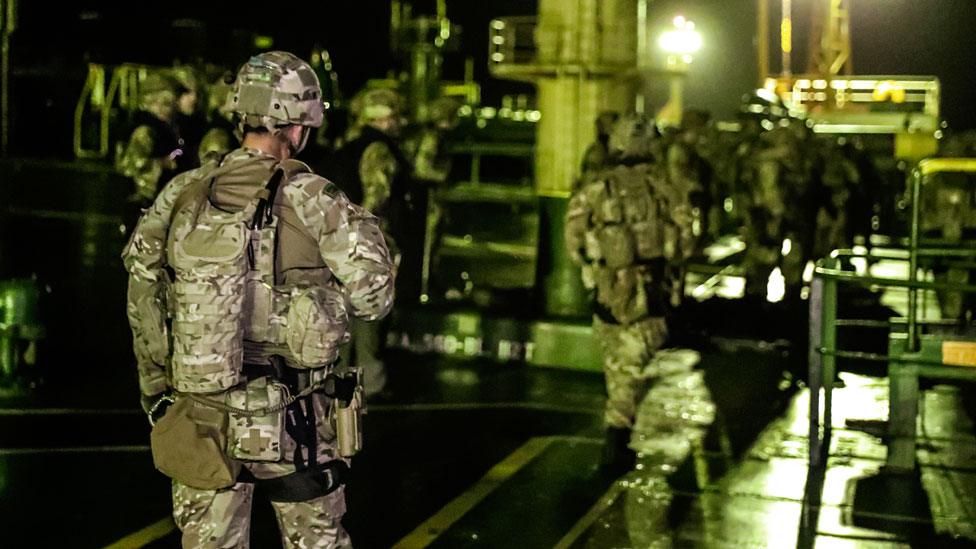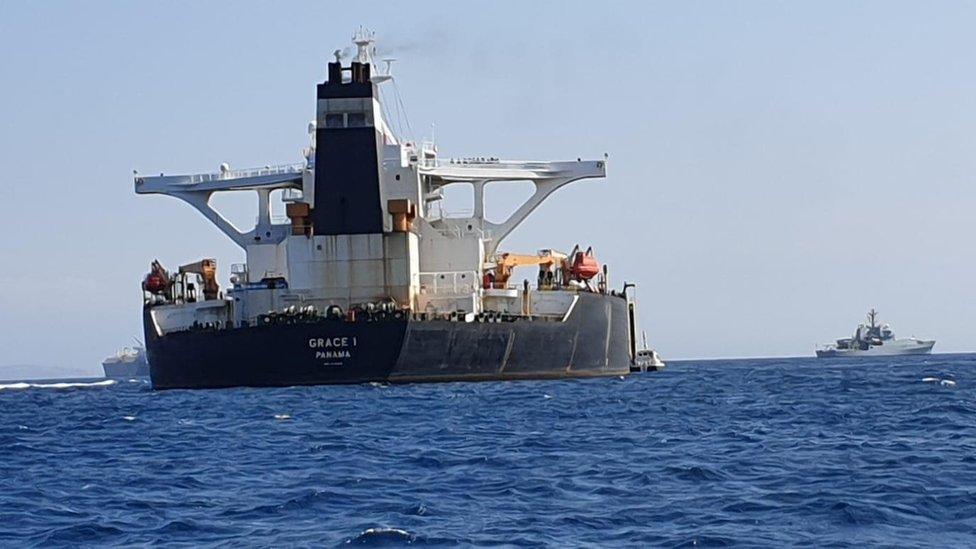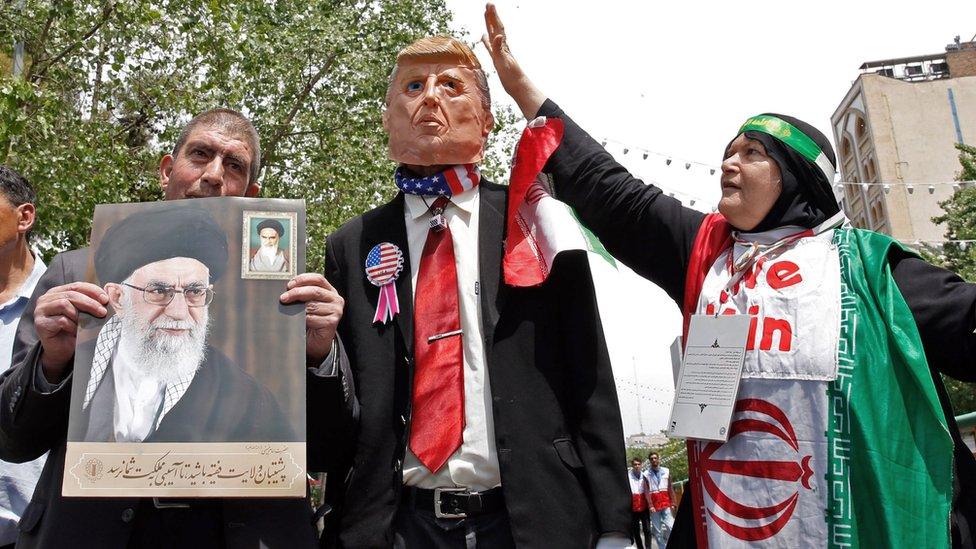Iranian official threatens to seize British oil tanker
- Published
The oil tanker is suspected of carrying crude oil to Syria
An Iranian official has said a British oil tanker should be seized, if a detained Iranian ship is not released.
British Royal Marines helped officials in Gibraltar to seize the super-tanker Grace 1 on Thursday, after it was suspected of carrying oil from Iran to Syria, in breach of EU sanctions.
A court in Gibraltar has ruled the ship can be detained for a further 14 days.
Iran later summoned the British ambassador in Tehran to complain about what it said was a "form of piracy".
Mohsen Rezaei said Iran would respond to bullies "without hesitation".
Mr Rezaei - a member of a council that advises the Supreme Leader, Ayatollah Khamenei - said, in a tweet: "If Britain does not release the Iranian oil tanker, it is the authorities' duty to seize a British oil tanker."
The BBC has been told a team of about 30 marines, from 42 Commando, were flown from the UK to Gibraltar to help detain Grace 1 and its cargo.
Gibraltar said there was reason to believe the ship was carrying Iranian crude oil to the Baniyas Refinery in the Syrian Mediterranean port town of Tartous.
The territory was initially able to detain the ship for 72-hours, but Gibraltar's Supreme Court granted a 14-day extension on Friday.
Iran's Foreign Ministry condemned the initial seizure of the vessel as illegal and accused the UK of acting at the behest of the United States.
The UK Foreign Office dismissed claims of piracy as "nonsense".

Royal Marines disembarking Grace 1 on Thursday
Spain's Acting Foreign Minister Josep Borrell said, on Thursday, Spain - which disputes British ownership of Gibraltar - was studying the circumstances of the action, but said it followed "a demand from the US to the UK".
BBC defence correspondent Jonathan Beale said, while Britain has been keen to suggest it was an operation led by the Gibraltar government, it appears the intelligence came from the US.

Analysis
By Kasra Naji, BBC Persian special correspondent
Iran's threat to retaliate against the impounding of its super-tanker is an indication of how hurt Tehran is by the UK's action.
In the eight years of war in Syria this appears to be the first time Iran's supply of oil to its ally has been interrupted, even though EU sanctions have existed for almost the whole duration.
The episode also reflects worsening relations between Iran and the UK over a range of issues - particularly the continued imprisonment of British-Iranian mother Nazanin Zaghari-Ratcliffe.
The tanker and its cargo are probably worth more than $200m (£160m).
Iran is looking for ways to respond to what it sees as illegal and an act of piracy. It has the capability to take over a British ship in the Gulf and would see such a move as proportionate.

On Friday, a senior Iranian lawmaker said the seizure of tanker was proof the UK "lacks honour" and takes orders from the US.
Mostafa Kavakebian, who leads the Iran-UK parliamentary friendship group, tweeted that the seizure was "a form of piracy and illegal hostility towards Iran".

Tensions between the UK and Iran have been exacerbated by the detention of Nazanin Zaghari-Ratcliffe
White House national security advisor John Bolton said the seizure was "excellent news". He added that the US and its allies would continue to prevent regimes in Tehran and Damascus from "profiting off this illicit trade".
Foreign Secretary Jeremy Hunt said the swift action would deny valuable resources to Syrian President Bashar al-Assad's "murderous regime".
The Baniyas Refinery, where the Iranian tanker was believed to be taking the oil, is a subsidiary of the General Corporation for Refining and Distribution of Petroleum Products - a section of the Syrian ministry of petroleum.
The EU says, external the facility therefore provides financial support to the Syrian government, which is subject to sanctions, external because of its repression of civilians since the start of the uprising against President Assad in 2011.
The refinery has been subject to EU sanctions since 2014., external
This latest row comes at a time of escalating tensions between the US and Iran.
The Trump administration - which has pulled out of an international agreement on Tehran's nuclear programme - has reinforced punishing sanctions against Iran.
Its European allies, including the UK, have not followed suit.
Nonetheless, there have been growing tensions between the UK and Iran too, after Britain said the Iranian regime was "almost certainly" responsible for the attacks on two oil tankers in June.
The UK has also been pressing Iran to release British-Iranian mother Nazanin Zaghari-Ratcliffe who was jailed for five years in 2016 after being convicted for spying, which she denies.
- Published4 July 2019

- Published6 January 2020
